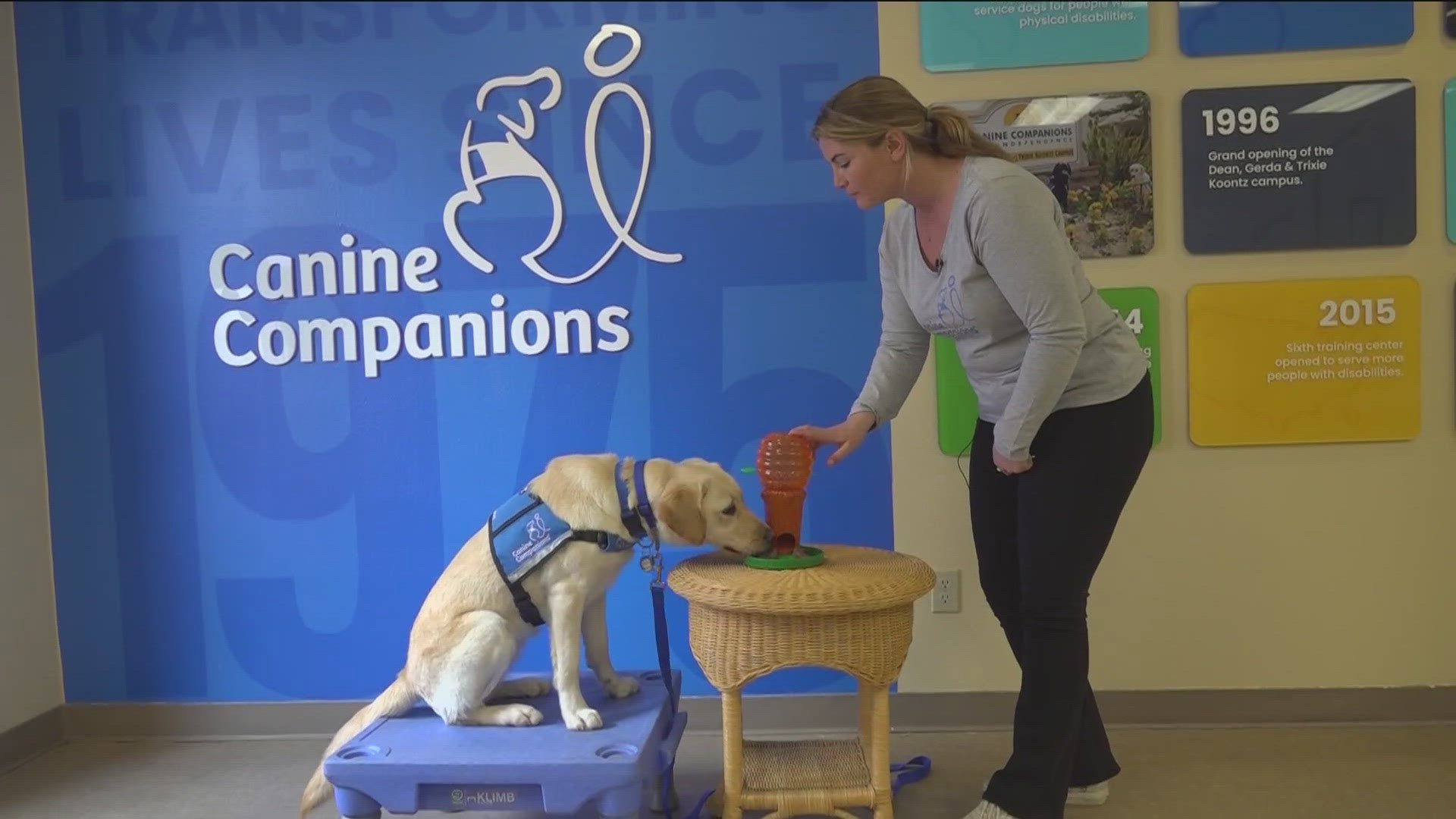SAN DIEGO — Canine therapy is being prescribed at children’s hospitals across the country.
But Rady Children’s Hospital, who is ranked one of the top ten children’s hospitals in America, does not have a resident canine therapy program - but you can help.
CBS 8 is partnering with Rady Children’s to help bring that kind of medicine to kids. We take a look at the type of medical school the dogs go through starting at birth.
Two-year-old Rianna, a Golden Retriever/Labrador mix, is at the beginning of her extensive two-year dog training at Canine Companions in Oceanside, a nationwide nonprofit that provides service, facility and therapy dogs at no cost to the person or organization needing a dog but it’s costly to maintain the program.
“She’s cuddling and giving me a lot of love right now, but she’s in working mode,” said Kate Incremona, Client Services Program Manager at Canine Companions.
Facility dogs are specially trained for a hospital setting. The dogs are calm and their commands and their skills are controlled.
“Nobody has to worry about the dog jumping on them or pulling on their leash,” said Incremona. “They are trained to walk politely next to someone whether they’re walking in a wheelchair, canes, crutches, there’s never going to be a safety concern. We don’t want to accidentally step on an injured limb or mess with any of the wires,” said Incremona.
Rianna can bowl, retrieve and she can play cards.
“It doesn’t look super difficult. But this is something that can be used in any sort of therapeutic intervention,” said Incremona.
She can help with physical therapy but also be a good distraction to help ease the scariness of treatments.
“Now I have her up close and personal with me. I can get some kisses if I would like, I can tell her my deepest, darkest secrets. Share what I’m concerned about what I’m worried about, or be completely distracted from an IV going into my arm or something like that all while it’s very controlled,” said Incremona.
She says resident dogs, also known as facility dogs, can rise to the challenge in a pediatric hospital.
“These dogs are different from service dogs because they are working with a wide variety of different patients, people's emotions, every client is going to have a different interaction style to meet their needs,” said Incremona.
Canine Companions has helped train facility dogs at Children’s Hospital Orange County, Children’s Memorial Hermann in Texas and Mary Bridge Hospital in Tacoma, Washington.
This type of healing power is what Rady Children’s Hospital in San Diego says it needs.
“We really need the community’s support to make this happen,” said Alex Loker, Rady Children’s Hospital, Vice President of Philanthropy.
CBS 8 is Working FUR Kids and partnering with Rady Children’s Hospital to raise money to start its own resident canine therapy program starting with three resident dogs.
While programs like Canine Companions is free of charge to organizations, the cost to start the program and sustain it, pay the salaries of the facilitator and vet care among other things is expensive.
“Facility dogs, they have a job. When they get paired with a facilitator or they’re in a hospital, they’re an employee, they go to work Monday through Friday, a full 40-hour week, and then they go home and get to turn off and become a pet dog once that workday is over,” said Incremona.
Rady Children’s says its child life canine specialists will be the facilitators.
At Canine Companions they pair the dogs with a facilitator who is deemed the best fit and they go through a two-week training.
“They learn all about canine behavior, learning theory, how to read the dog’s body language, how to understand how to communicate with them. And we teach them everything that the dog knows, we teach them how to utilize those 45 plus service commands,” said Incremona.
Many child life specialists have advanced their skills beyond the training as well.
“You could be the best therapist in the world. You’re just going to get more out of someone if you have a Rianna tagging along with you and practicing these motor exercises and all of those sorts of strategies that they’re working on,” said Incremona.
Dogs are showing they can lead the way in treating a child.
“Your emotions travel down the leash, so they can feel things in a way that is pretty indescribable,” said Incremona.
Working Fur Kids is an effort to help raise funds in collaboration with the public, to start a resident canine therapy program at Rady Children’s here in San Diego. Please consider making a monetary donation to kickstart this essential program that will help ease the pain and suffering of children who are patients at Rady Children’s Hospital.
WATCH: The science behind the connection between a human and a dog | Working FUR Kids

